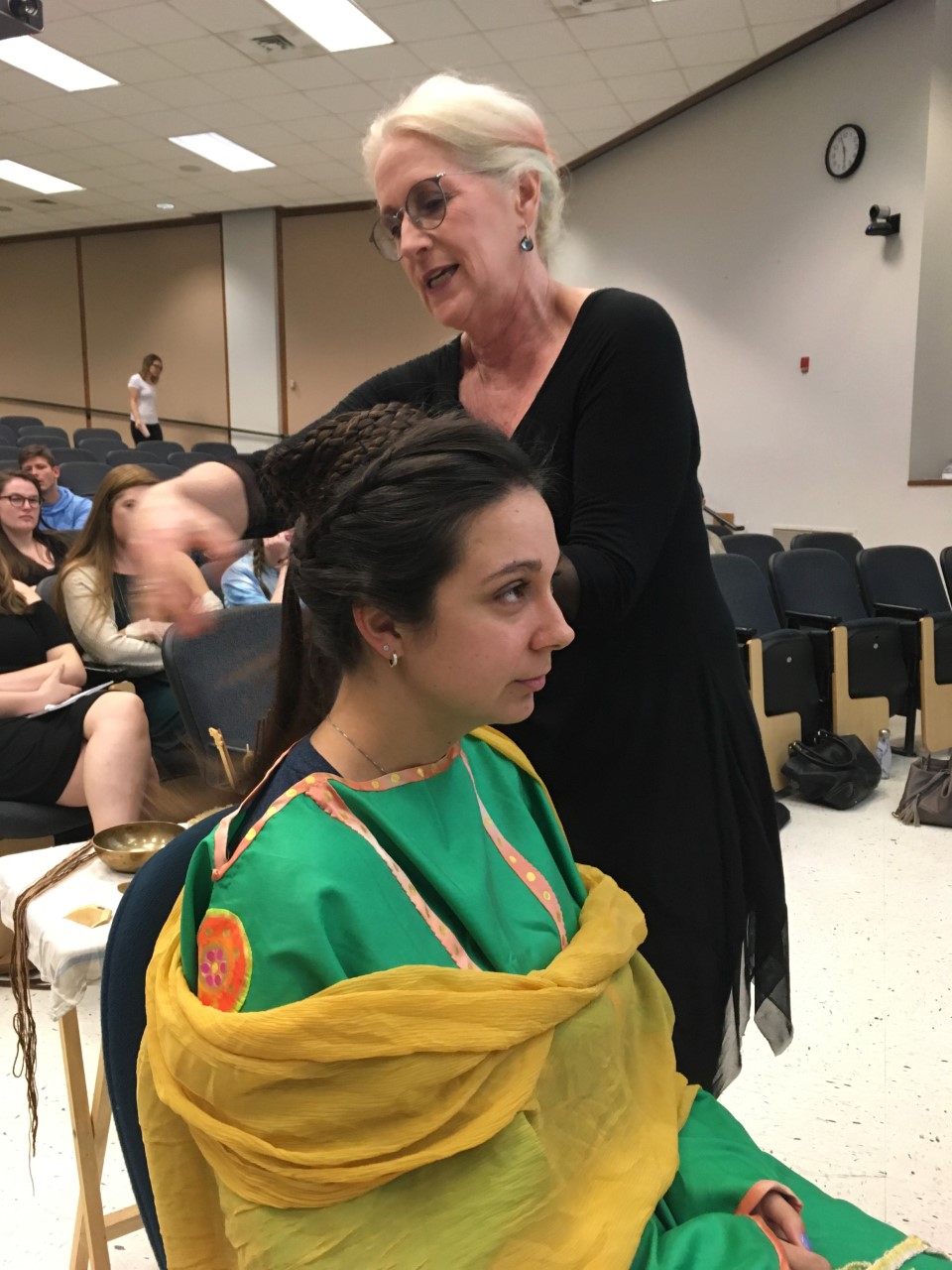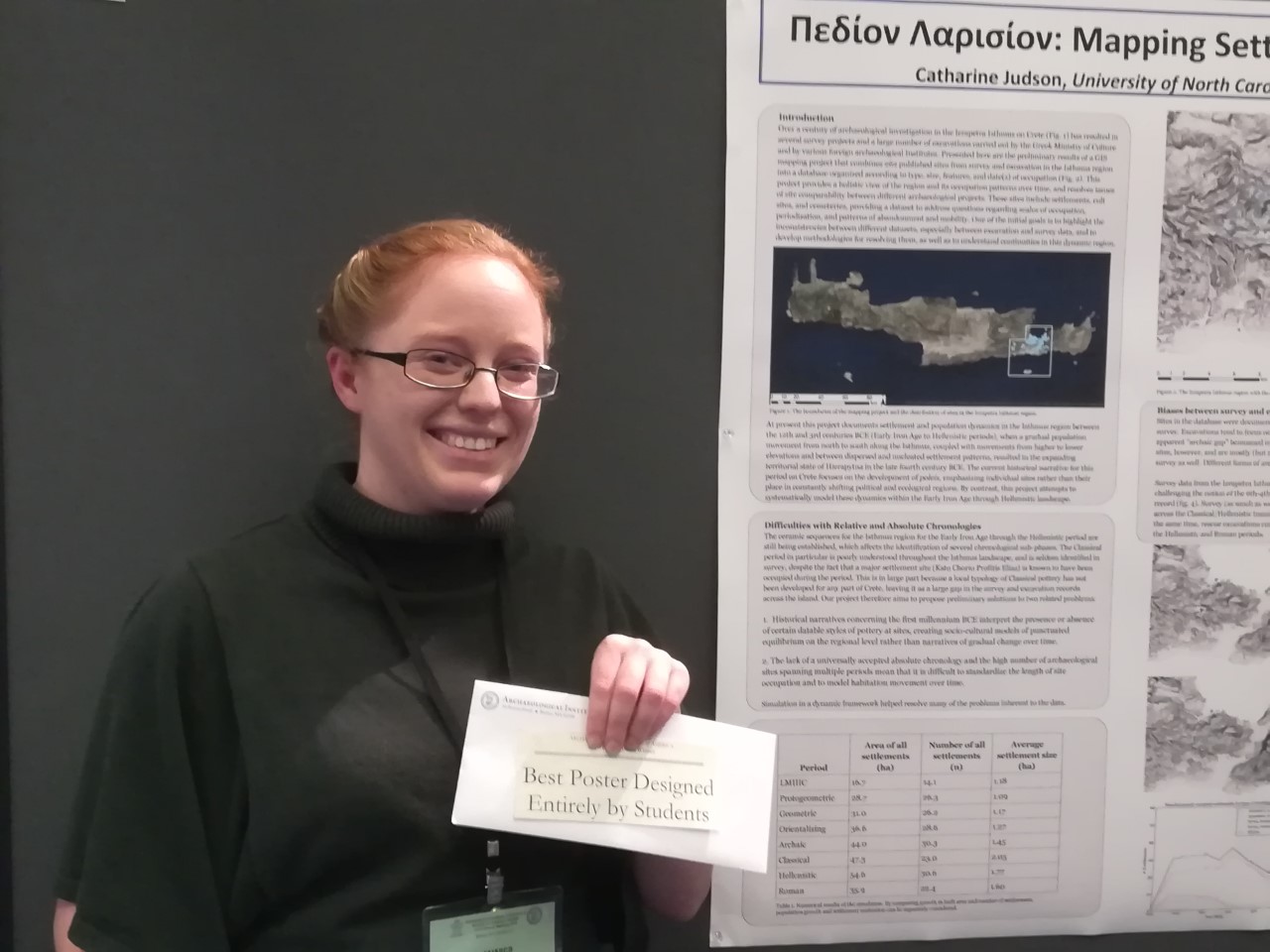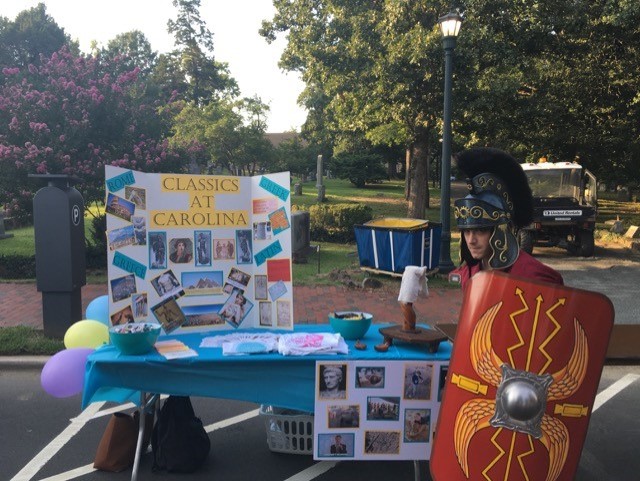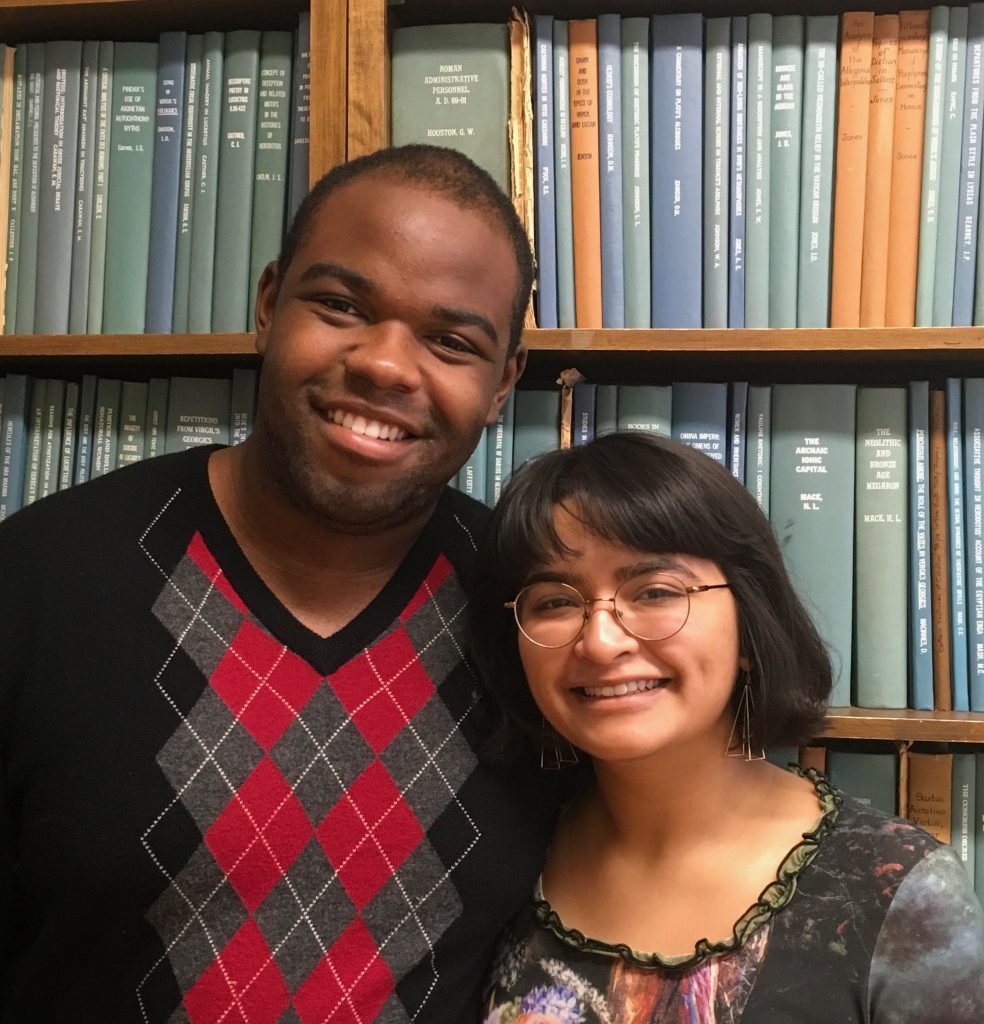Chair’s Letter
This has been a year of changes for the Department, as seems in fact to be the case every year. This year, I am pleased to report, most of them have been positive, although there are inevitably some losses as well as gains. In April, our colleague Luca Grillo announced that he will be resigning as of this summer in order to join the Department of Classics at the University of Notre Dame, where his wife Jennie has been offered a very good position in the Department of Theology. Notre Dame’s gain will of course be our loss, since Luca has made outstanding contributions to the department in his time with us and would have continued to do so for years to come. But I am glad that we were able to benefit from his presence for as long as we did, and we wish him and Jennie and their two daughters all the best in the next phase of their lives.
We are also saying farewell to Jim Lesher, who is retiring from the Department of Philosophy. Jim is a specialist in the Pre-Socratics, especially Xenophanes, and in his years at Carolina has been a valued adjunct member of our faculty and a wonderfully generous teacher and mentor, from whose wisdom and support many of our students have greatly benefitted. The Department helped to co-sponsor a colloquium in his honor on April 20th, at which many of our former students spoke: Jake Rohde (BA 2017, now in the PhD program in ancient philosophy at Yale), Amanda Kubic (BA 2016, who will be entering the PhD program in comparative literature at Michigan this fall), Andrew Wein (Post-Bacc 2013, currently in the PhD program in philosophy at Berkeley), and Aileen Das (BA 2008, now an Assistant Professor in Classical Studies at Michigan). Jim and his wife Eleanor will continue to live in the area, however, so we hope that socially at least they will continue to take part in the life of the Department.
To offset these losses, at least to the extent possible, it has been wonderful to have Patricia Rosenmeyer, our new Paddison Professor of Classics, as a member of our faculty this year. We are already benefitting from Patricia’s experience, thoughtfulness, and initiative, and as she gets more settled we look forward to benefitting still more in the years to come. In addition, congratulations are due to my colleague Janet Downie, who has been promoted to Associate Professor with tenure as of July 1st. Lastly, we are also looking forward to the arrival of another new faculty member in the fall. Suzanne Lye received her BA from Harvard in 1998 with a major in History & Science. After a stint in the business world, she returned to university to pursue a degree in Classics, receiving her PhD from UCLA in 2016. Since then she has been an Academic Diversity Postdoctoral Fellow in the Department of Classics at Dartmouth. Suzanne’s dissertation was on the underworld in ancient Greek literature, considered through the lens of intertextuality. She has also published articles on Hesiod, Apollonius of Rhodes, and Heliodorus. We are delighted that she will be joining us next year.
In current faculty news, Sharon James was awarded the Women’s Classical Caucus Leadership Award for 2017, which honors “an individual for outstanding contribution in encouraging women to enter and remain in our field.” Sharon is of course eminently deserving of this recognition, although anyone familiar with her outstanding work as a mentor will know that, as she is quick to point out, she has been active in encouraging men as well as women to enter and remain in our field. For his part, Bob Babcock was awarded one of the University’s Tanner Awards for Excellence in Undergraduate Teaching, after receiving one of the largest numbers of nominations this year. This is the third year in a row that members of our instructional staff have won Tanner Awards, bringing our total to three faculty members and two graduate student teaching fellows. Not bad for one of the smallest units on campus! The department has a long tradition of a strong commitment to undergraduate education, which our current faculty and graduate students are very ably upholding. I will note just a few examples of their commitment and creativity. After winning a course development award from the Center for Faculty Excellence, Emily Baragwanath has completely reworked CLAS 121, ‘The Greeks’, to shift it from a lecture course to a more interactive format, taking advantage of one of the campus’ new ‘smart classrooms’. Both Al Duncan and Sharon James taught First Year Seminars on ancient drama that in different ways emphasized performance and the diversity of the modern reception. Hérica Valladares, along with Vicki Rovine in the Department of Art and Art History, received a College course development award for a new interdisciplinary course on ‘Art and Fashion from Rome to Timbuktu’, comparing the role of women’s fashion in ancient Rome and modern Africa, which they taught for the first time this spring.

Connected with Hérica’s and Vicki’s course was one of our most successful outreach events of the past year, a visit by ‘hair archaeologist’ Janet Stephens. Ms. Stephens is a professional hair stylist who became interested in how Roman women achieved the elaborate hairstyles that are familiar from portrait sculpture and, using her professional knowledge, gradually learned to reproduce them. During her visit in late February, she gave a public lecture and demonstration to a crowd of some eighty students, faculty, and community member and the next day led a hands-on workshop at the Ackland Museum. Her visit was the subject of a featured story in the University Gazette. The Department co-sponsored Ms. Stephens’ visit together with the Triangle Society of the Archaeological Institute of America, as we also did the visit later in the spring semester of Gideon Avni, the head of the Archaeology Division of the Israel Antiquities Authority, whose talk on the archaeology of religious interaction in late antique Palestine was also very well attended. In the wake of these two successful visits, we worked out an arrangement to put our collaboration with the AIA Triangle Society on a more formal basis, so that the Department will henceforth act as co-sponsor of all their events as part of our program of community outreach and engagement.
These collaborations are just one of the ways that we are working towards one of the priorities that we identified in last year’s strategic plan, which is to develop and promote the Department as a resource and model for the people of North Carolina in their active engagement with the ancient Mediterranean world. With this in mind, I worked this year with Emma English, the president of UNC-Chapel Hill chapter of Eta Sigma Phi, to retool their undergraduate conference, which they have now been organizing for five years, to have a North Carolina focus. Emma contacted the leaders of other undergraduate Classics groups across the state, and although the complexities of organization meant that the involvement of other groups was ultimately less robust than we had hoped, the conference itself, held on April 7th, was a success, with student presenters from Elon and East Carolina University as well as Chapel Hill; Janet Downie and I served as faculty respondents. The participants found the experience enriching and exciting, and I hope that our experiment may eventually lead to an annual state-wide conference that will rotate between campuses and promote increased connections between both students and faculty.
Other events were geared towards Classics at the secondary level. On February 10-11, some fifty-five secondary school teachers took part in a weekend workshop on Active Latin, led by Justin Slocum Bailey, a highly successful innovator in the area of Latin pedagogy. Luca Grillo took the lead in organizing this event, which was co-sponsored with Duke’s Department of Classical Studies in partnership with the Paideia Institute, and reported that it was highly successful in presenting practical ways for teachers to incorporate the active use of spoken Latin into their classrooms, with all the pedagogical benefits that has been shown to bring. Lastly, as we have for the past several years, the Department also hosted the annual State Convention of the North Carolina Junior Classical League, which in early April brought to campus some six hundred enthusiastic Latin students at the middle and high school levels. Hérica Valladares gave a popular presentation on Roman women’s fashion and I gave one on the practice of animal sacrifice that, despite not being able to use the PowerPoint presentation that I had prepared, also seemed to go well. Our former student Liz Clark (PhD 2017) told me that some of her middle school students were in my audience. They reported to her that, when I announced that I couldn’t show the PowerPoint, they thought ‘this is going to be really lame’. ‘But,’ they went on to say, ‘it wasn’t lame at all!’. That seems to me high praise indeed.
At the same time that we are increasing our community engagement at the local and state levels, we are also maintaining our national and international presence. In June, Jim O’Hara, as president of the Vergilian Society, presided over the society’s annual conference at the Villa Cumanum, about which you can read more here. Jennifer Gates-Foster is part of a team that this past fall was awarded a multi-year 1.5 million euro grant by the European Research Council for a project in the eastern desert of Egypt. Closer to home, Janet Downie took a lead role in organizing the inaugural meeting of a new research network, the Second Sophistic Colloquium, which brings together younger scholars from across the US and Canada who have research interests in the literature and culture of the high Roman empire. Their long-term aim is to build an ongoing research community in North America that will provide support for scholarship and teaching in post-classical literatures, and thus to expand the horizons of Classics as it is traditionally conceived.
The Department has also hosted a variety of international visitors over the course of the year. Ivo Topalilov, an archaeologist at the University of Shumen in Bulgaria, is currently in the midst of a three-month residence as the recipient of a Fulbright award, with a project on political propaganda in the cities of Roman Thrace. He presented a well-attended Tea Talk on his research in late April, and will be with us to the end of June. At the very start of the academic year we enjoyed a multi-day visit from Di Yan, a young Chinese scholar of Classics who is working on her PhD at Cambridge. Di presented a lecture on her research, on the Athenian ideology of autochthony, as well as a Tea Talk on the study of Classics in China. Di is associated with Boya College, a western-style liberal arts College that is part of Sun Yat-Sen University in Guangzhou. It was fascinating to learn about the growing interest in liberal arts education in China, and their cross-cultural (European and Chinese) approach to Classics. Lastly, in mid-September we hosted a week’s visit by Martin Dinter, one of our colleagues at King’s College London, who gave a lecture and took part in several of our classes. Martin’s visit to Chapel Hill followed hard on the heels of our fourth annual KCL-UNC Graduate Colloquium, which this year took place in London; you can read more about it here.

The graduate students also organized their own colloquium at UNC in co-operation with their counterparts at Duke, around the theme of ‘Public and Profane: Ugliness, Indecency, and Scandal in the Ancient World’. Tom Hawkins of Ohio State University and Sarah Levin-Richardson of the University of Washington both presented public lectures in the morning of Saturday, February 17th, followed by workshops for graduate students in the afternoon. In other graduate student news, Catharine Judson (PhD 2018), along with former undergrad Drew Cabaniss (BA 2015, now in the PhD program in Classical Art and Archaeology at Michigan), was awarded the prize for ‘Best Poster Designed Entirely by Students’ at the annual meeting of the AIA, for their presentation on mapping settlement patterns on the Ierapetra Isthmus. Katie Tardio won a Fulbright Research Grant for Spain as well as the AIA’s John R. Coleman Traveling Fellowship to pursue dissertation research in Spain in 2018-19. Another Fulbright recipient is Emma Buckingham, who will be based at the American School of Classical Studies in Athens for her project on ‘Connectivity and Networks of Greek Dispersal in the Central Mediterranean.’ Cicek Beeby, who spent the past year in Greece working on her dissertation, will continue there another year thanks to an award of a Dissertation Completion Fellowship by the Graduate School. Another successful applicant for these highly competitive Graduate School research awards is Katelin McCullough, whose Werner P. Friedrich Off-Campus Dissertation Research Fellowship will allow her to pursue dissertation research on women in civic life in Roman-era Cyrenaica and Crete. Lastly, lest anyone think that only archaeologists will be traveling abroad, both Andrew Ficklin and Kelly McArdle will take part in the American Academy in Rome’s Summer Program, thanks to financial support from the Department’s Berthe Marti Fund.

As this lengthy rehearsal of successes indicates, our graduate students are thriving. Our recent PhDs are also doing about as well as one could expect in the current wretched job market; if very few of them have tenure track jobs, they all have academic employment. Although our graduate program is clearly serving them well, the very fact that most of its key elements are twenty years old or more suggests that it is time to revisit it. Over the course of this year the faculty have had a series of meetings to discuss possible changes to the program, with the goal of revising it to reflect the current state of the field while maintaining the strengths that have stead us in such good stead over the years. We are considering a wide range of possibilities and trying not to take anything for granted. This will be a slow process, since it is important that we think through all the different parts as well as the way they fit together, and I don’t expect that we will be ready to implement the changes for at least another year. But our discussions have been very productive, and it’s been great simply to have the chance to talk as a group about what we think a good graduate program in Classics in the early 21st century should look like.
One change that will be implemented next year concerns not the graduate program but departmental organization, even though graduate students are closely involved. We have retired the venerable position of Departmental Senior Teaching Fellow, which has over the years morphed from one whose duties were in line with its title to a sort of all-purpose administrative assistant. In its place we have established two new positions with more accurate titles: the Senior and the Junior Program Assistants (SPA and JPA for short). The duties of the SPA will largely be those of the former DSTF; the JPA will largely act as her or his assistant, but will also be in charge of organizing our series of Tea Talks. I owe thanks to Andrew Ficklin and Sarah Eisenlohr who will serve respectively as our inaugural SPA and JPA. Another new graduate student position that we have established is the Watlington Fellow for Undergraduate Outreach, funded in part by a generous gift by Amanda (née Giannini, PhD 1973) and Mal Watlington. We have in the past few years been developing a range of activities to promote and publicize the department, our degree tracks, and our course offerings. In addition to the ever-popular Latin T-shirt slogan contest (see here) and ‘Classics at Carolina’, our start-of-the-year undergraduate outreach event, our graduate students, at the initiative of Katie Tardio, successfully organized a table to publicize the department at FallFest, a marathon event for new students that takes place the Sunday before the start of classes. It gradually became clear to me that the grad students generally have more creative ideas for connecting with undergraduates than we faculty do, and so it seemed a good plan to formally designate, and compensate, a student to help with our outreach. I look forward to working next year with Hannah Sorscher, our inaugural Watlington Fellow, who will oversee these various activities and also serve as an advisor to Eta Sigma Phi and a liaison with the North Carolina Junior Classical League.

Our current undergraduates continue to do us proud. Five of our students were inducted into Phi Beta Kappa this year. Among winners of departmental prizes, I will single out Evan Colby, who won both the Eben Alexander Prize for Greek and the Albert Suskin prize for Latin, and our winners for the Herington Competition, Jermaine Bryant for Latin and Ashley Choo-Hen for Greek. Jermaine will be taking over as president of our chapter of Eta Sigma Phi, and has some exciting ideas about outreach to schools. Ashley, for her part, was also one of this year’s winners of the Classical Association of the Middle West and South’s Manson Stewart Fellowship. Lastly, but hardly least, congratulations to Philip Wilson, winner of the SCS’s Lionel Pearson Fellowship. The Fellowship will enable him to study for a year at Oxford before entering the PhD program at Harvard.
In closing, I must thank all the people who have contributed to our ongoing success. First and foremost are my faculty colleagues in the department, who constantly go above and beyond duty in their dedication to our students and our collective enterprise. I am grateful as well for the support of our Senior Associate Dean, Terry Rhodes, and the Dean of the College, Kevin Guskiewicz, who continues to be a stalwart advocate of the liberal arts. Our students, of course, are our fundamental raison d’être, and they are essential to our success not only through their excellence as students but, as should be clear from my letter, for their many contributions to the life of the department. As always, the true sine qua non is our office staff, Cinnamon Weaver, Kim Miles, and L.E. Alexander, who keep us all in line and make sure that things get done correctly and on time. I must thank L.E. in particular, since she is the person primarily responsible for this issue of Tabulae. Lastly, I am as always very grateful to our many friends and supporters from outside the department. It is thanks to their generosity that we have the resources we need to make good our potential. As the various reports both here and elsewhere in this newsletter make clear, we continue to do just that, and we are deeply appreciative to all those who make possible our ongoing success.